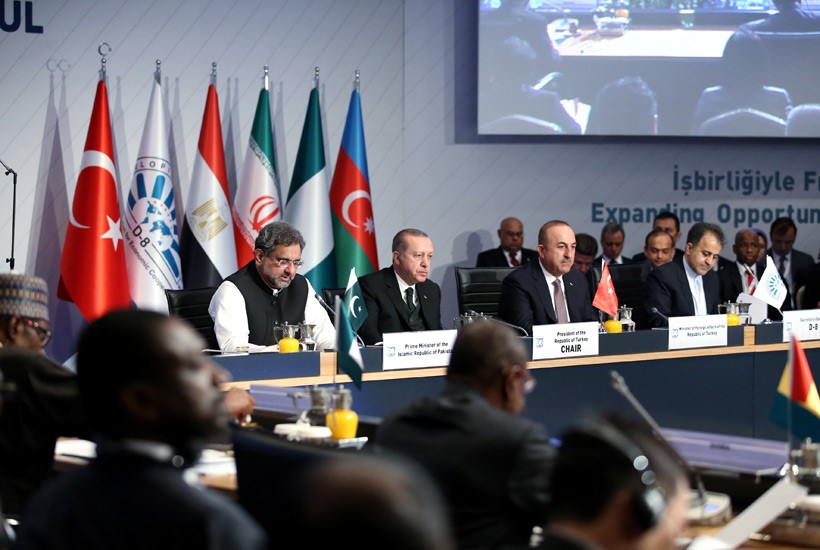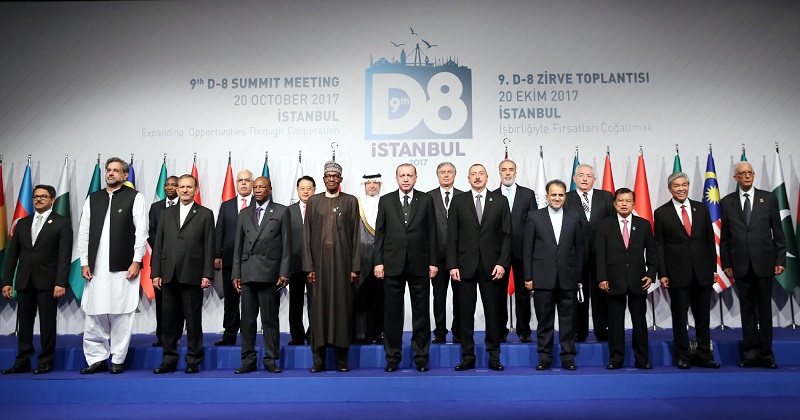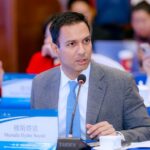ISTANBUL, Turkey: With focus on upgrading its communications, energy infrastructure, and enhancing regional connectivity under the China-Pakistan Economic Corridor (CPEC), Pakistan on Friday sought enhanced trade and economic partnerships with D-8 member states through stronger rail, road, air and sea links, a win-win for all.
“Connectivity-led growth is a good example of South-South cooperation. We seek similar partnerships with D-8 member states – through road and rail routes, where possible but also through stronger air and sea connections,” Prime Minister Shahid Khaqan Abbasi said while addressing the Opening Session of 9th D-8 Summit being hosted by Turkey in Istanbul with the theme “Expanding Opportunities through Cooperation”.
Besides Prime Minister Shahid Khaqan, President of Turkey Recep Tayyip Erdogan, Nigerian President Muhammadu Buhari, Azerbaijani Leader Ilham Aliyev, Iran’s first Vice President Eshaq Jahangiri and the Vice President of Indonesia Jusuf Kalla attended the 9th D-8 Summit.
The Summit adopted the Istanbul Declaration 2017 and the D-8 Istanbul Plan of Action to inject further dynamism into the pace of progress of the Organization.
The D-8 leadership took stock of progress in all areas, and expressed the hope that implementation of projects and programmes would make the partnership visible and tangible to the peoples of the member States.
In the Summit’s Opening Session, Shahid Khaqan Abbasi handed over the Chairmanship of D-8 Organization to Turkish President Recep Tayyip Erdogan. Before that Pakistan was the Chairman of D-8 Organization which has representation of eight developing Countries including Bangladesh, Egypt, Indonesia, Iran, Malaysia, Nigeria, Pakistan and Turkey.
“Mr. President, I congratulate you on assuming the Chair of the D-8 Summit. I am confident that your wisdom, sagacity, dynamism and firm commitment will bring new vigour to the D-8 Organization for Economic Cooperation,” Shahid Khaqan Abbasi said.
In his address, Prime Minister Shahid Khaqan Abbasi further said that as Pakistan was celebrating 70 years of its Independence, it was confronted with many challenges over the last decade.
“We faced unrelenting terrorism emanating from instability in our neighbourhood and the environment in the region and beyond,” he said.
However, he stressed that as a result of a comprehensive strategy and unwavering resolve, Pakistan had successfully turned the tide.
“Improved security has led to economic recovery. Pakistan’s economy has recorded a significant revival in the past four years. Over this time, we have focused on upgrading our communications and energy infrastructure, and enhancing regional connectivity,” he added.
The prime minister said that CPEC will further put our economy on an upward trajectory of robust growth.
“We are also working on energy connectivity projects. Pakistan’s integration into the Eurasian Belt and Road network will provide a firm foundation for Pakistan’s rapid economic development,” he added.
Khaqan appreciated the very apt theme for the 9th D-8 Summit chosen by Turkey as “Expanding Opportunities through Cooperation”, and said that it was in complete harmony with the post-2017 development agenda, visualising sustainable development as one of the core elements of people-centric development.
“Indeed, shared and joint prosperity is the only form of secure and sustainable prosperity. Inclusion based on collaboration ensures that there are no losers in the development effort – all are winners.”
The prime minister said that Pakistan assumed the Chair of D-8 Organization for Economic Cooperation in November 2012 at the eighth Summit in Islamabad which adopted two landmark documents: the D-8 Charter and the Global Vision. These documents have provided the essential basis for our joint endeavours, he added.
Shahid Khaqan Abbasi said that as Chair, Pakistan made every effort to proactively lead the Organization towards the realization of its objectives and vision. It was a privilege for us to host the Summit Meeting, two sessions of the Council and four sessions of the D-8 Commission and a number of Sectoral meetings since November 2012, he added.
Khaqan said that another significant milestone achieved during this period was the Observer Status for D-8 at the United Nations, adding that this status enabled the organization to closely interact with various UN agencies and affiliated institutions for cooperative arrangements in priority areas for us. The status has also given the D-8 an enhanced profile and standing at the international level, he remarked.
“As we gather here to renew our collective pledge to strengthen mutually beneficial cooperation, we must also take stock of the progress made so far on trade and economic partnership goals we set for ourselves. This Summit is a good opportunity for us to identify and remove the impediments in the way of achieving the Organization’s objectives,” he said.
The prime minister said that 20 years ago, a shared vision motivated the leaders of our countries to establish this organization to promote cooperation in the key areas of agriculture, industry, SMEs, trade, transportation, energy and tourism.
“However, the progress achieved so far falls short of our expectations, necessitating measures to accelerate momentum for stronger partnership,” he added.
Shahid Khaqan Abbasi pointed towards the stagnation of intra D-8 trade, after an initial increase, adding, the apprehension is that the target of US $ 500 billion in 2018, envisaged in the 2008 Kuala Lumpur Summit Roadmap, might remain elusive.
“It is, therefore, important for us to fully implement various instruments and agreements aimed at facilitating trade amongst member states, especially those related to Preferential Trade, Small and Medium Enterprises, Customs, Simplification of Visa matters and Civil Aviation. This would certainly pave the way for substantial increase intra D-8 trade,” he added.
The prime minister said that sectoral meetings at the ministerial level have already chalked out the roadmaps, and now is the time to start implementation. There may be challenges but there are also opportunities like never before, he added.
“While it is imperative for the governments of member countries to facilitate trade and investment by adopting the necessary legal framework for investment protection and creating an enabling environment for business in their respective countries, it is the private sector that can make the best use of emerging opportunities for trade and joint ventures. It is, therefore, of utmost importance that we also actively promote entrepreneurship in our countries,” he added.
“The 20th Anniversary of the D-8 is an occasion for us to renew our commitment to the accelerated realization of its vision and objectives. As a group, the D-8 has vast potential and resources.”
“However, realizing our combined potential and optimizing our collective resources requires cooperation and collaboration amongst us at every level and every field. Only then will we be able to attain the critical synergy that will bring shared, secure and sustainable prosperity to our nations,” he added.
The prime minister said that while he was certain that the Organization would continue to move steadily along the path of even more robust economic cooperation, it was also their sincere desire to see the D-8 enter the project-implementation phase with clear focus on the development, progress and prosperity of our peoples.
“We also aspire for it to have a stronger voice at the international level,” he added.
In addition, the prime minister said that he and his delegation were deeply touched by the warm welcome and hospitality they received ever since their arrival.
“I must commend the government of Turkey for the excellent arrangements made for this Summit,” he said.
The prime minister also expressed his profound appreciation to Secretary General Seyed Ali Muhammad Mousavi for efficiently steering the agenda of the D-8 Organization for Economic Cooperation during his tenure in office.
“On behalf of the people and government of Pakistan, I assure you of our full support and cooperation in our collective efforts to achieve tangible results. In Pakistan, you will always find a willing partner and friend,” Khaqan said.





